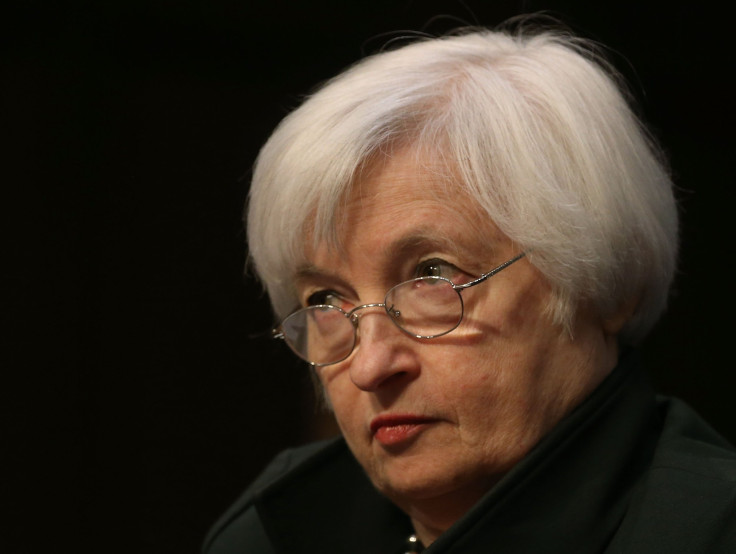Fed Makes Stress Test Changes Following Report To Remedy Faults

Six years after the Federal Reserve began bank stress tests amid the Great Recession, it is revamping the annual practice after internal reviews found the exams were faulty, the Wall Street Journal reported. The changes, disclosed in a Fed internal watchdog report, showed the exams were still troubleshooting through problems and the Fed wasn't handling the stress tests -- a key part of the central bank's supervision of large financial firms -- with "the same rigor" it requires of financial institutions, the Journal said.
The stress tests are designed and run by the Fed, using a computer model simulating how banks would perform should a hypothetical recession hit the U.S. The results effectively set capital requirements providing benchmarks, which in turn affect bank performance.
But the modifications to the tests, which are often a source of tension and debate within the financial industry, will not address core questions like how strict or accurate the exams are. Instead the changes will be procedural shifts in implementation and administration, such as how the Fed staffs the tests.
The reviews reportedly found the Fed had faults within its process for double-checking the computer models, often relying too much on key personnel and not having enough staff on hand. Some procedures involved in the validation process also were found to be unclear. At times staff in charge of validating changes would find changes were finalized without their approval, the validators said in the report. A person close to the situation disagreed with that finding, the Journal said.
The reviews concluded the Fed would have condemned a financial institution for similar mistakes, the Fed's Office of Inspector General said, noting: "Similar findings identified at institutions supervised by the Federal Reserve have typically been characterized as matters requiring immediate attention."
The stress tests have drawn criticism from some bankers as being unpredictable and unnecessarily intrusive, and questions about the exams' effectiveness, concerning their importance to financial institutions, are a significant knock against the Fed. Banks do not have access to the computer models, but their business can be affected by the results. The tests, created in 2009, are aimed bolstering confidence in the stability of U.S. banks and ensuring taxpayers will not be called on to bail out banks without enough capital amid another severe downturn. Should banks not meet Fed standards, regulators can restrict the financial institutions from paying dividends to shareholders.
US Fed Chair Janet Yellen Says: We Do Great Deal To Explain Stress Test Methodology
— CNBC-TV18 (@CNBCTV18Live) November 4, 2015The reviews, which were done at the Fed's behest, were conducted in 2014, and in response the Fed has dedicated a full-time team to the validation process. It has also changed the process for making late-stage changes to guarantee validators see last-minute shifts in the model.
Michael Gibson, director of the Fed’s Division of Banking Supervision and Regulation, said the inspector general’s report “did not find any mistakes in the validation process and did not identify any problems with our models,” according to a statement sent to the Wall Street Journal. He also noted the findings were welcomed and aligned with concerns the Fed had noted independently.
Banks are regularly examined. Under the Dodd-Frank Act, companies perform self-run stress tests, which all institutions with more than $10 billion in assets must report to the Office of the Comptroller of the Currency in the Department of Treasury, starting in 2016.
Bank of America shakeup comes after the Fed chastised it for not anticipating problems with its stress test http://t.co/8MP9mnYgRH
— Real Time Economics (@WSJecon) July 22, 2015Major financial institutions have struggled with the supervisory tests from the Fed in years past. Four of the big names in finance -- Goldman Sachs, JPMorgan Chase, Morgan Stanley and Bank of America -- all just barely passed in March. In 2016 capital requirements could become even tougher, while some key assumptions made by the Fed could be eased as well, according to Bloomberg.
The stress test reviews are providing bankers with an opportunity to criticize the effectiveness of the exams. The lack of transparency of the test process has caused significant frustration in the industry, which has objected to the heightened scrutiny from the start.
"From an investor's point of view, I'm appalled at this exercise," John Douglas, former general counsel to the FDIC, told Bankrate in 2009. "This is stuff that's done routinely in banks behind the scenes between the examiner and the institution. To have it done in a semipublic fashion has not been helpful to our financial system. It causes the consumer to ask a bunch of questions that I just don't think the consumer needs to worry about."
© Copyright IBTimes 2024. All rights reserved.












